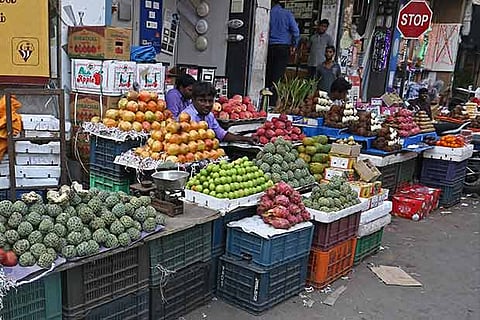

Chennai
The usually crowded Koyambedu flower market wore a subdued look on Wednesday, as vendors, seated amid their colourful wares, shouted the discounted rates to a handful of customers. Barely hours after Prime Minister Narendra Modi announced the demonetisation of 500 and 1000 rupee notes, to tackle the problem of corruption and black money, the impact was keenly felt by the small-time traders, who primarily depend on cash transactions. The cash crunch resulted in a dip in the day’s business.
V Umapathy, an 80-year-old businessman, watches the meagre crowds listlessly, as his son, Balaji oversees the running of the flower stall. The sales have gone down by almost 50%, Balaji said in an expressionless voice. The lack of footfalls had also caused the price of flowers to nosedive. “Only a day ago, on Tuesday, we sold the yellow samanthi flower (marigold) at Rs 60 a kg. Today, the price has gone down to Rs 30 per kg. Similarly, malli (jasmine) was priced at Rs 600 earlier but now, we have slashed it down to Rs 300 per kg,” said the owner of Sri Uma Flower Stall.
The biggest problem, said many traders, was the lack of small change. The common refrain was that for a purchase of Rs 50, the customers were handing out 500 rupee notes. Due to this, squabbles between the customers and vendors broke out at regular intervals, said vendors. Ganesh, the 30-year-old wholesaler, rued that he had to turn customers away. “All the small change has run out. Where will we get change from, when the ATM or banks are not working today?” he asked, while attending to a customer, who was keenly inspecting the fiercely orange Kanakambaram flowers.
During the transaction, Hamsaveni, a flower vendor, queried if Ganesh had change, as she only had a Rs 500 note. Gesturing to her, Ganesh added, “See, this is the problem!” Hamsaveni retorted, “This sudden announcement has hurt the smalltime sellers like us. We don’t really have enough change at our disposal. It is difficult!”
Fearing the prospect of losing out on the day’s business, some traders have been accepting the 500 and 1,000 rupee notes, with the intention of changing it later at the bank. However, there is no clarity regarding the process of changing these notes at the bank, they added. S Parasuraman, owner of wholesale fruit trading unit which has a daily turnover of Rs 5 lakh, said, “Since it was a sudden move, there was no choice but to accept the notes or lose out on business. We are hoping that once the bank opens, we would know how we can change the notes we earned today.” VR Sounderrajan, President, Koyambedu Vegetable Wholesale Association, said it was business as usual but there was a 10% dip in regular sales, due to the mild panic created by the announcement. The market supplies to 30,000 traders and has a daily turnover of Rs 25-30 crores. “The notes were accepted by the traders, as it will be deposited in the bank account at the end of the business day,” he said.
Bursting shelves, empty shops
The shops in Parry’s Corner, which usually burst at the seams on normal days, were empty on Wednesday, prompting some of the businesses to shut early on what seemed like an ‘unofficial’ holiday. After the news of demonetisation broke, retail outlets stayed open late on Tuesday night, for last minute customers looking to change their notes. On Wednesday, the situation was opposite. Sitting in his empty shop, Hyder M, Partner of AH Jewellery, said that the lack of customers saw subdued sales. “The shops here make around a lakh daily on an average. The sales on Tuesday went on till 10 pm. However, that wasn’t the case on Wednesday as very few people even stepped out of their homes,” added the 52-year-old businessman.
Ramesh B, owner of the 125-year-old enterprise RS Jain & Sons, said the day’s earnings were hardly 20% of the regular sales, which is between Rs 70,000 to 80,000 per day. Pointing towards the road, Ramesh said, “Have you ever seen the bustling Govindappa Naicken Street so quiet? It is like an unofficial holiday. Since many people have had difficulty in getting enough cash in hand, people are staying at home or restricting their movement.” Some traders, like Lokesh Kothari, who runs Kothari Electricals Enterprises, are busy despatching goods to their regular customers. “We have to deliver bulk orders for builders, paid through cheques or internet banking. Some of the regular customers who deal largely in cash, are experiencing problems. But that will only be for today. Once the banks open, they can surely change the notes,” added this businessman. Without sufficient small change and customers, some traders chose to shut shop by 4 pm. “After scrounging around, I got a few 100 rupee notes. There has been hardly any crowd, because of which I am closing early today,” said 65-year-old Velsamy P, owner of a kirana shop.
(People thronged petrol bunks, the only outlets authorised to accept demonetised currency, while vegetable, food stores and flower shops were empty of customers on Wednesday)
Visit news.dtnext.in to explore our interactive epaper!
Download the DT Next app for more exciting features!
Click here for iOS
Click here for Android